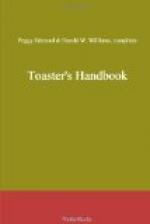If one were asked to go further than this and to give offhand a definition of humor, or of that elusive quality, a sense of humor, he might find himself confronted with a difficulty. Yet certain things about it would be patent at the outset: Women haven’t it; Englishmen haven’t it; it is the chiefest of the virtues, for tho a man speak with the tongues of men and of angels, if he have not humor we will have none of him. Women may continue to laugh over those innocent and innocuous incidents which they find amusing; may continue to write the most delightful of stories and essays—consider Jane Austen and our own Miss Repplier—over which appreciative readers may continue to chuckle; Englishmen may continue, as in the past to produce the most exquisite of the world’s humorous literature—think of Charles Lamb—yet the fundamental faith of mankind will remain unshaken: women have no sense of humor, and an Englishman cannot see a joke! And the ability to “see a joke” is the infallible American test of the sense of humor.
But taking the matter seriously, how would one define humor? When in doubt, consult the dictionary, is, as always, an excellent motto, and, following it, we find that our trustworthy friend, Noah Webster, does not fail us. Here is his definition of humor, ready to hand: humor is “the mental faculty of discovering, expressing, or appreciating ludicrous or absurdly incongruous elements in ideas, situations, happenings, or acts,” with the added information that it is distinguished from wit as “less purely intellectual and having more kindly sympathy with human nature, and as often blended with pathos.” A friendly rival in lexicography defines the same prized human attribute more lightly as “a facetious turn of thought,” or more specifically in literature, as “a sportive exercise of the imagination that is apparent in the choice and treatment of an idea or theme.” Isn’t there something about that word “sportive,” on the lips of so learned an authority, that tickles the fancy—appeals to the sense of humor?
Yet if we peruse the dictionary further, especially if we approach that monument to English scholarship, the great Murray, we shall find that the problem of defining humor is not so simple as it might seem; for the word that we use so glibly, with so sure a confidence in its stability, has had a long and varied history and has answered to many aliases. When Shakespeare called a man “humorous” he meant that he was changeable and capricious, not that he was given to a facetious turn of thought or to a “sportive” exercise of the imagination. When he talks in “The Taming of the Shrew” of “her mad and head-strong humor” he doesn’t mean to imply that Kate is a practical joker. It is interesting to note in passing that the old meaning of the word still lingers in the verb “to humor.” A woman still humors her spoiled child and her cantankerous husband when she yields to their capriciousness. By going hack a step further in history, to the late




